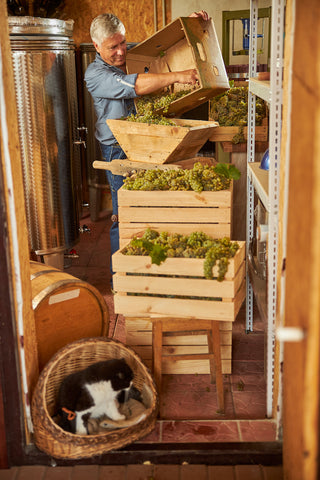Can Cats Eat Grapes? A Detailed Guide
Cats are known for their curious nature, and they often show interest in what their human companions are eating. While some human foods are safe for cats to consume in moderation, others can be toxic. One such food that raises concerns among pet owners is grapes.
In this blog article, we will explore whether it's safe for cats to eat grapes and what you should know to keep your feline friend healthy.

Why Grapes are a No-Go for Your Cat's Diet
The Risk with Grapes for Your Cat
The risk associated with grapes for your cat primarily revolves around their potential toxicity. While not all cats will react negatively to grape ingestion, it's impossible to predict which cats may be affected, making it a danger to all feline friends. Here are the key risks:Kidney Damage: The most significant and concerning risk is kidney damage. Even a small amount of grapes or raisins can lead to acute kidney failure in some cats. The exact mechanism behind this toxicity is not well understood, which makes grapes even more dangerous.
Symptom Delay: One of the troubling aspects of grape toxicity is the delay in symptoms. In many cases, symptoms may not appear immediately after consumption. Instead, they can develop within 24 hours to a few days, making it difficult for cat owners to connect the dots between grape consumption and illness.
Gastrointestinal Distress: Cats that ingest grapes may experience initial gastrointestinal distress. This can include symptoms like vomiting and diarrhea, which can be distressing and uncomfortable for your cat.
Lethargy and Loss of Appetite: A cat that has consumed grapes may become lethargic and lose interest in food, which are early signs of potential toxicity.
No Safe Threshold: Unlike some toxic foods where the danger is relative to the quantity consumed, there doesn't appear to be a safe threshold for grapes in cats. Even a small amount can pose a risk.
The primary risk with grapes for your cat is the potential for severe kidney damage and associated health issues. As a responsible pet owner, it's best to avoid feeding grapes or raisins to your cat altogether and opt for safe alternatives when it comes to treats and snacks.
Safe Alternatives for Treats for Cats
Providing your cat with safe and enjoyable treats is a great way to bond and reward them for good behavior. There are plenty of alternatives to grapes that you can safely offer to your feline friend. Here are some options:
Catnip: Catnip is a herb that many cats find irresistible. You can offer it in various forms, such as dried catnip, catnip-infused toys, or fresh catnip plants. It can induce playfulness and excitement in most cats.
Commercial Cat Treats: There are numerous commercial cat treats available at pet stores, and they come in various flavors, textures, and sizes. Look for high-quality brands with minimal additives and ingredients that are suitable for your cat's dietary needs.
Cooked Meat: Small amounts of cooked meat can be a delightful treat for your cat. Opt for lean and unseasoned options like boiled chicken or turkey. Remove any bones, skin, or spices, and cut the meat into small, bite-sized pieces. Be cautious not to make this a primary source of nutrition, as cats require a balanced diet.
Freeze-Dried Cat Treats: Freeze-dried cat treats are lightweight, easy to store, and come in various protein sources, such as chicken, fish, or beef. They are usually free of additives and preservatives.
Special Cat Grass: Some cats enjoy chewing on cat grass. Cat grass is not only safe but can also help with your cat's digestion and reduce hairball formation. You can buy cat grass seeds or ready-to-grow kits at pet stores.
Interactive Toys: Instead of food treats, consider interactive toys that dispense kibble or treats when your cat plays with them. These toys provide mental and physical stimulation for your cat and can be a fun way to keep them entertained.
Homemade Cat Treats: If you're interested in making your cat's treats, you can find various cat treat recipes online. Homemade treats can be a healthy option if you're mindful of the ingredients you use.
Cat Dental Treats: Dental treats can help improve your cat's dental health by reducing plaque and tartar buildup. These treats are designed to be crunchy, which can aid in cleaning your cat's teeth while they enjoy a snack.
When selecting treats for your cat, consider their specific dietary needs, age, and any food allergies or sensitivities. Always consult your veterinarian if you have concerns about your cat's diet or which treats are best for them. Moderation is key, as overindulgence in treats can lead to weight issues and other health problems.

What to Do if Your Cat Eats Grapes
If you suspect that your cat has ingested grapes, raisins, or any grape-containing products, it's crucial to act quickly. While not all cats may have a severe reaction to grapes, it's impossible to predict which ones are more sensitive, so it's best to err on the side of caution. Here's what you should do:
Contact Your Veterinarian: The first and most important step is to call your veterinarian immediately. Describe the situation and the amount of grapes your cat may have consumed. Your vet will provide guidance on the best course of action.
Observe Your Cat: Keep a close eye on your cat for any signs of distress or discomfort. Early intervention can make a significant difference in the outcome. Look for symptoms like vomiting, diarrhea, lethargy, loss of appetite, or changes in behavior.
Do Not Wait for Symptoms: Don't wait for your cat to show symptoms before contacting the vet. Grapes can be toxic to cats, and the toxic effects may not manifest immediately. It's essential to act as soon as you suspect grape ingestion.
Follow Veterinary Recommendations: Your veterinarian may advise you to bring your cat in for an examination, induce vomiting, or administer specific treatments. Follow their recommendations closely, as they are the experts in treating your cat's condition.
Prevent Future Incidents: Once your cat is out of danger, take steps to prevent access to grapes or raisins in the future. Store them securely, out of your cat's reach, and educate your household members and guests about the potential danger of grapes for cats.
Monitor Your Cat: Even after the initial treatment, your veterinarian may recommend ongoing monitoring to ensure your cat's complete recovery. Follow up with your vet as advised.
Leave a comment
